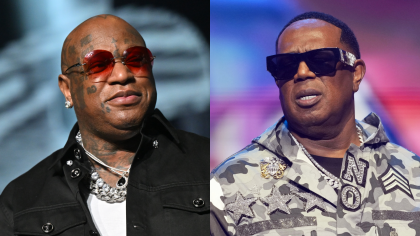Birdman and Master P: The Two New Orleans Titans Who Built the Blueprint for Southern Hip-Hop

For more than three decades, two names have towered over Southern hip-hop like pillars of concrete and steel: Bryan “Birdman” Williams of Cash Money Records and Percy “Master P” Miller of No Limit Records. Long before the South dominated charts, streaming platforms, award shows, and festival stages, these two New Orleans moguls were shaping a movement that would outlive trends, outgrow regional barriers, and redefine American music.
Today, as conversations about legacy, ownership, and cultural influence resurface across the industry, fans are once again revisiting the contributions of the two men who transformed New Orleans from an overlooked corner of the rap map into one of the most important centers of hip-hop innovation. Their stories, intertwined yet distinct, have reignited public interest thanks to a wave of online discussions and renewed appreciation for the eras they built.
The Birth of Two Empires

In the early 1990s, Southern hip-hop was still fighting for national validation. The East Coast had lyricism, the West Coast had G-Funk, and Atlanta was only beginning to form its identity. New Orleans — vibrant, soulful, and culturally rich — had yet to break through nationally. That changed when Master P and Birdman decided to build their own lanes.
Master P founded No Limit Records in 1991, first in California and later fully relocating the label to New Orleans. No Limit quickly became synonymous with independence, entrepreneurship, and prolific output. Master P wasn’t just a rapper and businessman; he was a strategist who reshaped the economics of hip-hop. He famously negotiated an unprecedented 85/15 distribution deal with Priority Records, keeping ownership of his masters and setting a precedent for artist autonomy that would influence generations.
Birdman, meanwhile, co-founded Cash Money Records in 1991 with his brother Ronald “Slim” Williams. Cash Money focused on developing homegrown talent from New Orleans neighborhoods — young artists with raw sounds that would eventually mold the modern Southern aesthetic. What began as a regional label soon evolved into a powerhouse after iconic signings like Lil Wayne, Juvenile, B.G., and Turk formed the Hot Boys, one of the most influential groups in rap history.
Two Sounds That Shaped a Region
Though both labels rose from the same city, their artistic identities diverged in style.
No Limit built a brand on emotional storytelling, street intensity, and an unmistakable visual aesthetic — from the famous Pen & Pixel album covers to the rapid-fire release schedule that kept fans engaged year-round. Artists like Mystikal, Mia X, Silkk the Shocker, C-Murder, and Fiend helped cement the label’s reputation as a cornerstone of late 90s rap culture.
Cash Money, by contrast, embraced a slicker, more melodic New Orleans bounce–influenced sound. The collaboration between Mannie Fresh’s production and the youthful charisma of the roster became the foundation for what would eventually evolve into one of the longest-running dynasties in hip-hop. Cash Money’s partnership with Universal Records in 1998 became one of the largest distribution deals in music history at the time.
Parallel Rise, Unspoken Rivalry

For years, fans debated the intensity of the rivalry between Cash Money and No Limit. Though both labels were often viewed as competitors for dominance in New Orleans, neither founder publicly engaged in a dramatic feud. Instead, each remained focused on building his empire.
Still, the cultural conversation has always framed them as dual titans: two moguls who built movements larger than themselves, movements that shaped everything from business models to regional pride.
A Lasting Legacy
Today, both labels represent more than nostalgia.
Master P is widely credited for pioneering the modern blueprint of independent music ownership, merchandising, film production, and athlete management. His business model predated the multi-industry expansions seen in today’s artists and entrepreneurs.
Birdman’s legacy, meanwhile, is directly tied to one of the most influential artists in rap history: Lil Wayne. Without Cash Money’s early investment in Wayne, there is no Tha Carter series, no Young Money Records, no Drake, no Nicki Minaj — arguably altering the entire trajectory of 21st-century hip-hop.
Together, the impact of their work continues to shape today’s artists, from the independent movements in Atlanta and Memphis to the entrepreneurial models of Houston and Miami.
A Cultural Conversation Reignited
As debates and discussions around the two moguls trend across social media once again, fans emphasize the same sentiment: Birdman and Master P didn’t just create labels — they created culture. They turned a city into a powerhouse, built opportunities for young artists, and opened doors that had long been closed to the South.
Their legacies remain woven into every corner of contemporary hip-hop. And now, as rediscovery of their contributions spreads across platforms, a new generation is learning what older fans have long known: the South didn’t rise by accident. It rose because two giants built it from the ground up.





